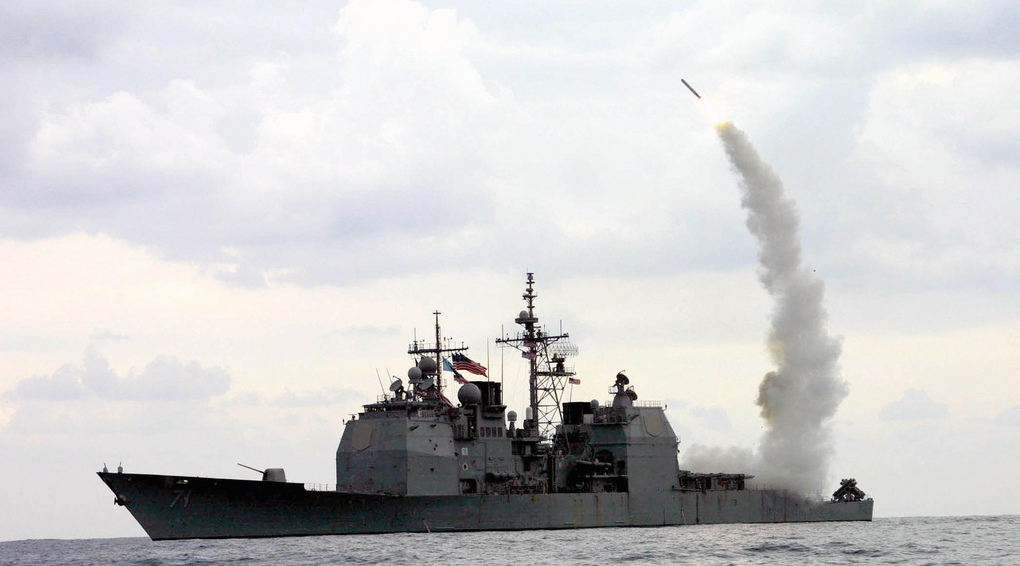As a rule, not long after taking office, U.S. presidents authorize overseas bombing.
Harry Truman is the prime example, nuclear bombing Japan and razing North Korea.
Nixon devastated Laos, Cambodia and of course Vietnam (3 million dead).
Both Bushes bombed Iraq.
Famously Bill Clinton bombed a medicine factory in Sudan to distract attention from the Monica Lewinsky affair.
Obama sent U.S. bombers to Libya.
Donald Trump has just attacked Syria. His “global leadership” has met with approval from NATO states, Canada included, and Western media.
Left unmentioned was the U.S. violation of the UN Charter obligation to use military force only in self-defence (Article 51) or with approval of the Security Council (Article 42).
With the U.S. exercising its military prerogatives, the Trump gong show got a taste of being treated as a normal presidency by the media and Congress. Any boost to the president’s approval ratings are not going to comfort those worried about the use of military force by an unstable personality.
For the Wall Street Journal, Trump has sent a needed message to Russia by bombing a Syrian airbase. The administration has demonstrated the U.S. will deal with Russia from a position of strength.
Trump’s bombing foray is about domestic politics. The far-fetched scenario where the U.S. president was elected thanks to Russian hacking of his opponent, where he is obligated to Russian business leaders, and where he is a pawn of Putin the Russian autocrat, had to be laid to rest.
With his bombing of Syria, Trump changes the channel, and shuts up the “progressive” Democrats and compliant media peddling the “Trump is in the Russians’ pocket” tag line.
By bombing Syria, Trump also establishes himself with the U.S. Army, Airforce, Navy and Marine Corp, the 17 U.S. intelligence services, and the foreign policy establishment — the deep state — who are the source of the ” he is beholden to Russia” message and who no president opposes without consequences.
Wanting to deter expanded Russian support for Bashar al-Assad, the murderous Syria dictator, the U.S. foreign policy establishment urged President Obama to act militarily.
By refusing to bomb Syria, Obama sent a message to the deep state: provide me — as U.S. president — with something other than a military option.
Under Obama, the U.S. and Russia negotiated a ban on Syria using chemical weapons.
Claiming renewed use of nerve gas against civilians by the Assad regime, in violation of its specific undertakings, Trump agreed to do what Obama had refused to do.
With a swift, unilateral decision to hit a Syrian airforce base, Trump signalled his willingness to allow the deep state to conduct U.S. foreign policy.
U.S. armed forces are on the ground in Syria. Washington directs drone attacks.
In response to a 2011 democratic uprising protesting the dictatorship Assad inherited from his father in 2000 (and plans to pass along to his son), the Syrian president has been butchering his own people. Estimated deaths are over 400,000; registered Syrian refugees total over 5 million.
The abject failure of world institutions, opinion makers, governments, and the international left to come up with a strategy to stop the regime of terror visiting Syria is itself an abomination.
Political paralysis allowed the Russian military to step up its Syrian presence and defend its Mediterranean port facilities on the Syrian coast.
Active participation and support from Iran and Russia have amplified the atrocities committed by Assad.
The U.S. strategy has been to ally itself with Saudi Arabia and Israel, opponents of the Syrian regime, and to arm Islamist military groups who in normal circumstances would be considered “terrorists” by the U.S.
The short-sightedness of U.S. Arms for Jihadists policies is exceeded only by the incompetence of the EU to come up with an alternative strategy to oust Assad.
Faced with his own domestic “Muslim threat” Putin hoped to find an ally in Trump, who had declared himself ready to combat the Islamic State (ISIS) wherever and whenever.
Trump took the precaution of warning Russia (and through them, Assad) of the projected bombing mission, which in the event left a runway intact while taking out some Russian-supplied Syrian jets used to bomb opposition-held areas with little or no regard for civilian casualties.
U.S. bombing pre-empted UN supervised investigations into gas warfare in Syria. Use of chemical weapons by Assad was presumed not demonstrated. Both Russian and Syrian sources rejected the accusation the Syrian government was behind the chemical attacks.
Trump still refuses to admit Syrian refugees displaced by bombing (including now his own) to the U.S.
The U.S. bombing mission has put a temporary halt to a potential Putin-Trump bromance.
The Russians have nixed the Moscow and Washington deal to share Syrian air attack information designed to prevent military incidents.
The U.S. Secretary of State is on his way to Moscow for the usual “frank exchange of views” — preferable to military exchanges with live ammunition.
The postwar dream of a multilateral world order based on respect for international agreements has co-existed with the reality of U.S. hegemony. Justice, peaceful resolution of disputes, and arms control are secondary to the American agenda, and await a working multilateral alternative to U.S. hegemony.
Duncan Cameron is former president of rabble.ca and writes a weekly column on politics and current affairs.
Photo: IS1 Kenneth Moll, USS Cape St. George via Matt Morgan/flickr





